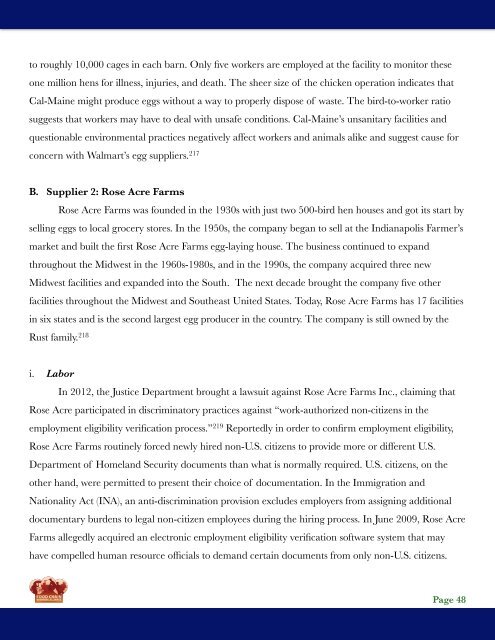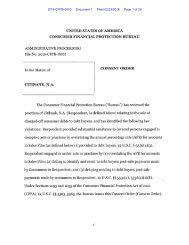Walmart-at-the-Crossroads-FINAL-06.04.15
Walmart-at-the-Crossroads-FINAL-06.04.15
Walmart-at-the-Crossroads-FINAL-06.04.15
Create successful ePaper yourself
Turn your PDF publications into a flip-book with our unique Google optimized e-Paper software.
to roughly 10,000 cages in each barn. Only five workers are employed <strong>at</strong> <strong>the</strong> facility to monitor <strong>the</strong>se<br />
one million hens for illness, injuries, and de<strong>at</strong>h. The sheer size of <strong>the</strong> chicken oper<strong>at</strong>ion indic<strong>at</strong>es th<strong>at</strong><br />
Cal-Maine might produce eggs without a way to properly dispose of waste. The bird-to-worker r<strong>at</strong>io<br />
suggests th<strong>at</strong> workers may have to deal with unsafe conditions. Cal-Maine’s unsanitary facilities and<br />
questionable environmental practices neg<strong>at</strong>ively affect workers and animals alike and suggest cause for<br />
concern with <strong>Walmart</strong>’s egg suppliers.<br />
217<br />
B. Supplier 2: Rose Acre Farms<br />
Rose Acre Farms was founded in <strong>the</strong> 1930s with just two 500-bird hen houses and got its start by<br />
selling eggs to local grocery stores. In <strong>the</strong> 1950s, <strong>the</strong> company began to sell <strong>at</strong> <strong>the</strong> Indianapolis Farmer’s<br />
market and built <strong>the</strong> first Rose Acre Farms egg-laying house. The business continued to expand<br />
throughout <strong>the</strong> Midwest in <strong>the</strong> 1960s-1980s, and in <strong>the</strong> 1990s, <strong>the</strong> company acquired three new<br />
Midwest facilities and expanded into <strong>the</strong> South. The next decade brought <strong>the</strong> company five o<strong>the</strong>r<br />
facilities throughout <strong>the</strong> Midwest and Sou<strong>the</strong>ast United St<strong>at</strong>es. Today, Rose Acre Farms has 17 facilities<br />
in six st<strong>at</strong>es and is <strong>the</strong> second largest egg producer in <strong>the</strong> country. The company is still owned by <strong>the</strong><br />
Rust family.<br />
218<br />
i. Labor<br />
In 2012, <strong>the</strong> Justice Department brought a lawsuit against Rose Acre Farms Inc., claiming th<strong>at</strong><br />
Rose Acre particip<strong>at</strong>ed in discrimin<strong>at</strong>ory practices against “work-authorized non-citizens in <strong>the</strong><br />
employment eligibility verific<strong>at</strong>ion process.”<br />
219<br />
Reportedly in order to confirm employment eligibility,<br />
Rose Acre Farms routinely forced newly hired non-U.S. citizens to provide more or different U.S.<br />
Department of Homeland Security documents than wh<strong>at</strong> is normally required. U.S. citizens, on <strong>the</strong><br />
o<strong>the</strong>r hand, were permitted to present <strong>the</strong>ir choice of document<strong>at</strong>ion. In <strong>the</strong> Immigr<strong>at</strong>ion and<br />
N<strong>at</strong>ionality Act (INA), an anti-discrimin<strong>at</strong>ion provision excludes employers from assigning additional<br />
documentary burdens to legal non-citizen employees during <strong>the</strong> hiring process. In June 2009, Rose Acre<br />
Farms allegedly acquired an electronic employment eligibility verific<strong>at</strong>ion software system th<strong>at</strong> may<br />
have compelled human resource officials to demand certain documents from only non-U.S. citizens.<br />
Page !48



